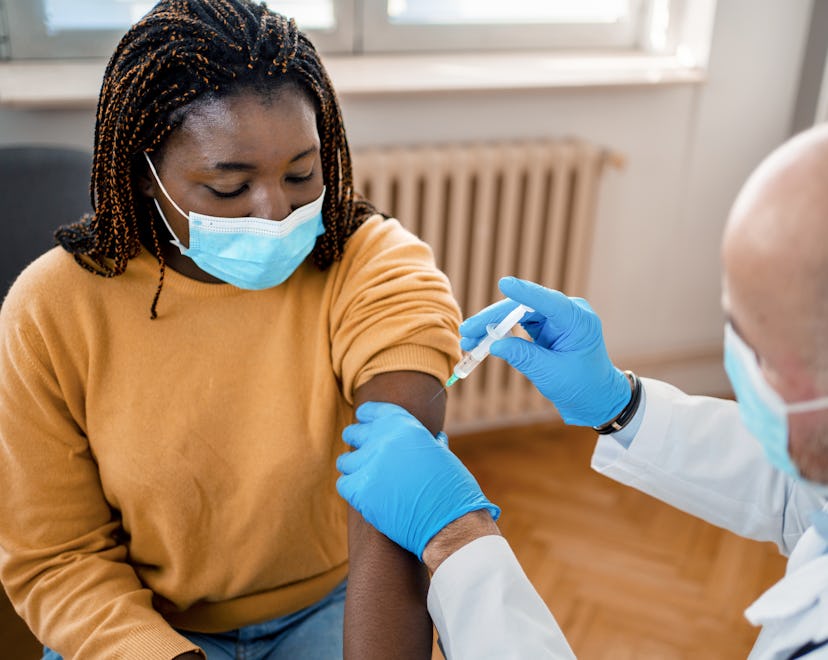Covid-19

Experts Answer All Your Questions About Getting Boosted After A Covid Infection
Like, is it even necessary?
Remember two and a half years ago when simply getting tested for Covid took a near-literal act of Congress? (Of course you do.) Now, there are so many more tools readily available to protect yourself from the virus: At-home rapid tests, masks, vaccines, and booster shots, just to name a few. However, just because those things are easily accessible now doesn’t mean you don’t have questions that deserve answers. Like, what about getting a booster after a Covid infection? You want to be protected, but you already had the virus — so now what?
Should you get a booster after Covid infection?
Yes, experts say that you should get a booster after a Covid infection if you are eligible. Current booster recommendations from the Centers for Disease Control and Prevention (CDC) vary based on age, personal health, as well as the timing and type of previous Covid vaccines. (The CDC website has a handy tool you can use to determine booster eligibility.) For eligible individuals, a booster can offer enhanced protection from Covid, even after a previous infection.
“Immunity against Covid illness and severe illness appears even better when the immunity is derived from a combination of vaccination and infection,” says Dr. Michael Chang, M.D., a pediatric infectious disease expert with Children’s Memorial Hermann Hospital and UTHealth Houston. “Data so far suggests that being vaccinated prior to infection, and then getting infected generates a broader and longer lasting immunity than vaccination or infection alone, what is now being called hybrid immunity.”
Chang explains that hybrid immunity “seems to offer the longest duration of antibodies,” and that keeping up with vaccinations can help provide a more predictable level of immunity.
This aligns with insight from Dr. Chinwe Mahaley, M.D., a pediatrician with Greenspring Pediatrics in Baltimore, who tells Romper that, “the durability of the natural immunity obtained from having the Covid infection is still not fully known.”
This is doubly true for anyone older or immunocompromised. “Covid vaccine effectiveness at preventing infection or severe illness also wanes over time, especially in people ages 65 years and older,” Mahaley tells Romper. So, getting boosted is especially important for high-risk groups such as those age 65 and older or who are immunocompromised, even post-infection.
New variants of Covid-19 have made hybrid immunity even more important. “Delta, Omicron, and its subvariants are able to ‘escape’ immunity from prior Covid infections as well as vaccination,” Chang says. “If you had infection early in the pandemic, it’s suspected that your protection against severe Omicron has likely decreased significantly. An additional dose of vaccine significantly increased protection against severe Omicron in those who previously were infected with Covid.”
One more reason to get boosted after infection? It can potentially help with long Covid symptoms. “For patients who may be suffering from post-acute Covid syndrome (PACS), aka long Covid, these symptoms appeared to decrease following Covid vaccination,” Chang says.
When should you get a booster after Covid infection?
Eligible individuals can safely get a booster after a Covid infection as soon as they are no longer contagious. “For most people, that's about 10 days after testing positive or 10 days after first noticing symptoms,” Mahaley says. However, there is no hard and fast timeline.
Whether protection is gleaned from infection or vaccination, Chang explains that, when it comes to how long antibodies will last, everyone is different. If you are concerned about getting a booster soon after a Covid infection, Chang says that, “If you were recently infected, it’s reasonable to wait around 3-5 months, as you likely had a boost in antibody levels from the infection.”
Another thing to take into consideration where timing of a booster after Covid infection is concerned is what course of treatment, if any, you received while infected. “If you’ve received monoclonal antibodies (i.e. Regeneron), it is best you wait 90 days before getting your booster Covid vaccine,” Mahaley tells Romper.
Could side effects be different for the booster after Covid?
If you’re concerned about the potential of negative side effects, both Chang and Mahaley tell Romper that getting a booster after a Covid infection won’t increase this risk. “The negative effects of getting a booster after Covid infection are mostly the same as just getting the booster vaccine,” Mahaley says. Serious side effects are rare, so for most individuals, booster side effects are limited to pain, redness, or swelling at the injection site, and other mild side effects such as fever, chills, nausea, body aches, and tiredness.
And though you may still be protected if you wait a few months post-infection, getting a booster shot sooner is likely still safe. “There is no evidence that getting a booster shortly (sooner than 3-5 months) after Covid infection increases the risk of any side effects or is associated with any dangerous complications,” Chang tells Romper.
Experts:
Dr. Michael Chang, pediatric infectious disease expert, Children’s Memorial Hermann Hospital and UTHealth Houston
Dr. Chinwe Mahaley, pediatrician, Greenspring Pediatrics in Baltimore
This article was originally published on